Lessons From Albert Bandura For Wellness Coaches
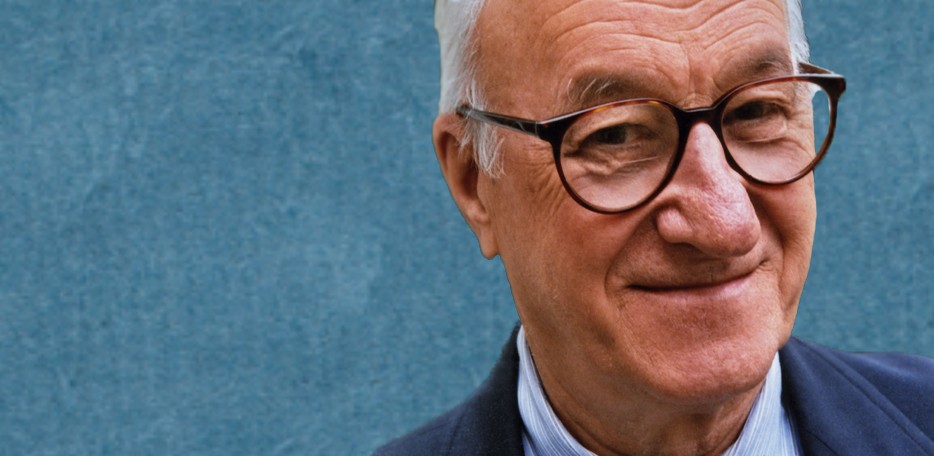
“Self-efficacy or belief in one’s ability to perform determines whether behavior will be initiated, how much effort will be expended, and whether the effort will be sustained.”
"People with high assurance in their capabilities approach difficult tasks as challenges to be mastered rather than as threats to be avoided." Albert Bandura
From ancient philosophers to Sigmund Freud and down to today’s latest psychological research, people have been attempting to understand what drives human behavior. If you were to pose the idea that what we do as human beings is a result of what we think and how we interact with our environment you would get few arguments. Yet such a theory is a relatively recent development in the study of psychology. Social psychologist Albert Bandura (http://psychology.stanford.edu/abandura) was primary among the people who have helped us validate the idea that our behavior is an interplay between what we observe in the world around us, how we self-reflect about it, and how we decide to go forward with action.
“With the publication of Social Foundations of Thought and Action: A Social Cognitive Theory, Bandura (1986) advanced a view of human functioning that accords a central role to cognitive, vicarious, self-regulatory, and self-reflective processes in human adaptation and change. People are viewed as self-organizing, proactive, self-reflecting and self-regulating rather than as reactive organisms shaped and shepherded by environmental forces or driven by concealed inner impulses.” (Pajares, 2002)
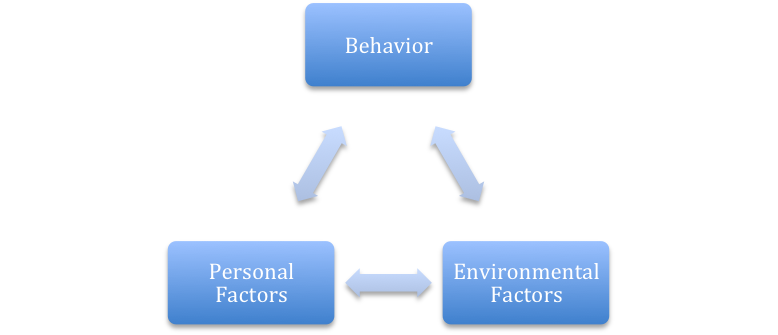
Model Of Reciprocal Determinism - Bandura
Because Social Cognitive Theory sees our behavior as part of a reciprocal, continually interacting circle, our counseling or coaching efforts can directed at the personal, environmental and behavioral factors.
For the wellness professional who works with people to help them improve their lifestyle behavior this is an easy theory to sign on with. We see our clients continuously facing inner and outer barriers that challenge their attempts at behavioral change. Inner barriers include the Personal Factors that Bandura talks about: cognitive, affective and biological events. Or more simply put, the ways in which our thoughts and belief systems limit us; the ways in which our emotions override our logic in self-defeating ways; and our own emotional-biological connection. Outer barriers include the Environmental Factors that add stress and/or support to our lives.
In wellness and health coaching (referred to hereafter as wellness coaching), effective methodologies go beyond simple assessment and goal-setting and recognize that what derails the best laid wellness plans are usually these inner and outer barriers. Central to the coach approach is the contention that human beings are accepted in coaching as being “naturally creative, resourceful and whole.” (Kimsey-House, H., Sandahl, P., Whitworth, L., 2011) (http://www.thecoaches.com/why-cti/buy-the-book). They are seen as having the ability, with the right support, to positively impact their world and their own lives.
“Social cognitive theory is rooted in a view of human agency in which individuals are agents proactively engaged in their own development and can make things happen by their actions. Key to this sense of agency is the fact that, among other personal factors, individuals possess self-beliefs that enable them to exercise a measure of control over their thoughts, feelings, and actions, that "what people think, believe, and feel affects how they behave" (Bandura, 1986, p. 25). Bandura provided a view of human behavior in which the beliefs that people have about themselves are critical elements in the exercise of control and personal agency. Thus, individuals are viewed both as products and as producers of their own environments and of their social systems.” (Pajares, 2002)
What wellness coaches observe is that there is often great disparity regarding the degree to which their clients believe that the efforts they make to improve their health and well being will be effective. Do they believe that they can affect their own health, and to what degree? For the wellness coach and client, this is the very essence of “self-efficacy”.
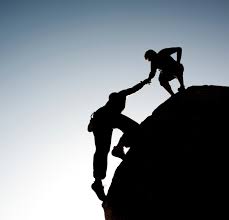 “Of all the thoughts that affect human functioning, and standing at the very core of social cognitive theory, are self-efficacy beliefs, "people's judgments of their capabilities to organize and execute courses of action required to attain designated types of performances" (p. 391).” (Pajares, 2002)
“Of all the thoughts that affect human functioning, and standing at the very core of social cognitive theory, are self-efficacy beliefs, "people's judgments of their capabilities to organize and execute courses of action required to attain designated types of performances" (p. 391).” (Pajares, 2002)
“Self-efficacy beliefs provide the foundation for human motivation, well-being, and personal accomplishment. This is because unless people believe that their actions can produce the outcomes they desire, they have little incentive to act or to persevere in the face of difficulties. Much empirical evidence now supports Bandura's contention that self-efficacy beliefs touch virtually every aspect of people's lives—whether they think productively, self-debilitatingly, pessimistically or optimistically; how well they motivate themselves and persevere in the face of adversities; their vulnerability to stress and depression, and the life choices they make.” (Pajares, 2002)
Many clients arrive to wellness coaching having experienced failure experiences which have negatively impacted their self-efficacy. Discouraged by perhaps numerous attempts to quit smoking, manage stress, or attain and then maintain a healthy weight, their belief in the own ability to succeed at lasting lifestyle improvement has been damaged. Yet, as Bandura has shown us, this belief needs to be strengthened for the person to garner the motivation to change and the tenacity to succeed.
How do we then build self-efficacy? Fortunately effective wellness coaching methodologies have built into them the very factors that Bandura has found effective.
"Reality is not so much what happens to us; rather, it is how we think about those events that create the reality we experience. In a very real sense, this means that we each create the reality in which we live." ~ Dr. Albert Ellis
"All that we are is the result of what we have thought; it is founded on our thoughts; it is made up of our thoughts. A man’s life is the direct result of his thoughts… We are what we think. All that we are arises with our thoughts. With our thoughts we make the world." ~ Gautama Siddhartha (Buddha)
Though he’s not quoted as saying so, the essence of Bandura’s work would agree with the old saying that “We create our own reality.” Most human motivation is cognitively generated, Bandura argues. We anticipate our actions with forethought and figure our chances of success largely based upon our past experience in this arena. This forms beliefs about what we can and can’t do. We set goals and form plans to realize the outcomes we desire. The way we set those goals is largely determined then by our perception of our past experience and our level of self-efficacy. This combined with our current thinking yields our performance in attempting to reach our desired outcome.
Causal Structure
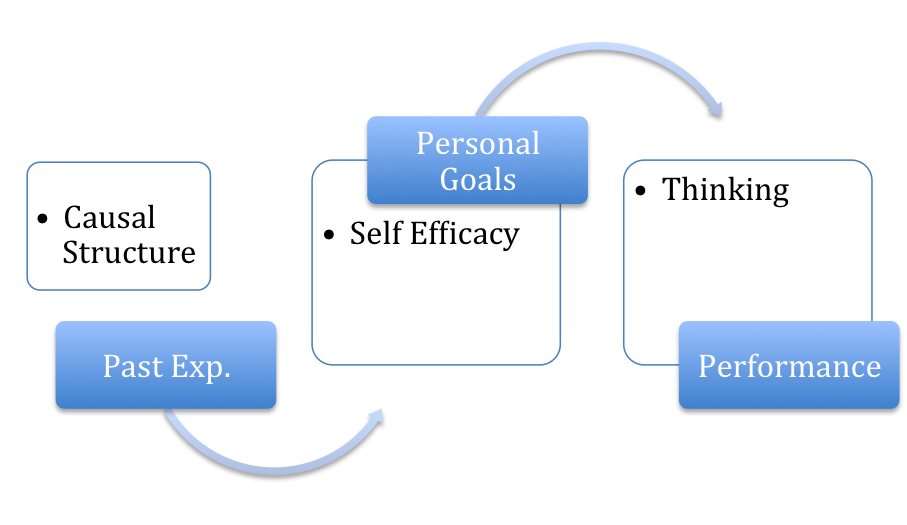
Perception of our Past Experience affects our Self-Efficacy. This in turn affects our expectations and the level at which we set our personal goals. This is then filtered through our thinking, or as Bandura puts it, our Analytic Strategies and this combination of Personal Goals and Thinking affects our Performance or outcome. So, if I have a history of failure at weight loss and low self-efficacy about succeeding at another attempt at losing weight I will set personal goals that may be minimal, or may be unrealistic. I then attempt to achieve these goals using strategies that are influenced by my lack of confidence, discouragement, and self-doubt, and my performance, or outcome suffers.
A Coach Approach Difference
Let’s say I now have a wellness coach helping me with the process of change. Firstly as I speak to my coach about my Past Experience, and they help me reframe my experience less negatively. I get empathy and support, even acknowledgement for how challenging weight loss has been for me, but I don’t get sympathy. My coach helps me discover what in my past experience was effective. What did work that I can use again?
My coach also works with me to improve my self-efficacy (see below) and help me build my feelings of greater self-esteem, self-confidence and helps me recognize and acknowledge my strengths that I can use in this change process. My coach is using the Positive Psychology approach that is inherent in coaching. Together my coach and I co-create a better set of Personal Goals that are optimistic, yet realistic. Through the coaching I discover more of the motivation that I have for improving my life, including losing weight. The coaching helps me see the motivational link between what action I am taking and how it will help me reach my greater desired outcome of living my healthiest, best life. This motivation helps me produce greater effort, push through barriers and, with my coach’s help, strategize though both internal and external barriers. The result is an improved Performance.
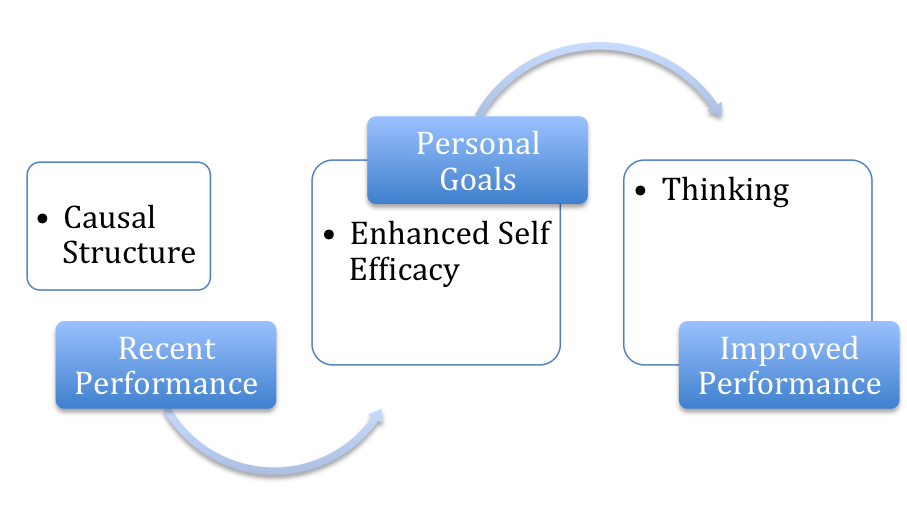
Now, when I look at my recent Performance I am encouraged by at least some level of progress. I now begin the Causal Structure of Change process again, and this time I begin by basing it on my Recent Performance, not my Past Performance. This helps push a higher level of Self-Efficacy within me. I set even better Personal Goals. My Thinking, my Analytic Strategies are more positive and effective and this all yields even better Performance. We are now on a positive circle of action and success that can be repeated, instead of a vicious circle of defeat.
How To Build Self-Efficacy
Most wellness professionals are already very familiar with the term self-efficacy and set improved self-efficacy as a desired outcome in virtually all of their wellness programming. Wellness coaches seek to help clients have greater belief in their ability, capacity, and confidence in positively affecting their health and improving their lifestyles. The question is “How?”.
Bandura (1997) identified four sources of information that affect our self-efficacy:
• Mastery Experiences – Self-mastery
• Vicarious Experiences – Role Modeling
• Verbal Persuasion – Social Persuasion
• Physiological Cues
Let’s look at how wellness coaches can help clients improve self-efficacy by working with these four factors.
 Mastery Experiences
Mastery Experiences
Mastery experience is the strongest and most effective source of building self-efficacy. As we say in coaching “Nothing succeeds like success!” An effective coach helps their client recognize and acknowledge themselves for even the smallest accomplishment. Many clients are notoriously poor at giving themselves credit for what the do accomplish and coaching can help them reframe this.
The coach helps their client avoid repeating self-defeating strategies they’ve used in the past and helps them devise more effective experiments at change. As clients set in place a wellness plan that sets out manageable goals and specific (easy) action steps that are in alignment with the client’s “readiness for change” (Prochaska, et.al. 1994) (http://www.prochange.com/transtheoretical-model-of-behavior-change) the probability of success is much greater. As the client experiences “mastery” it is very self-reinforcing and self-efficacy beliefs elevate.
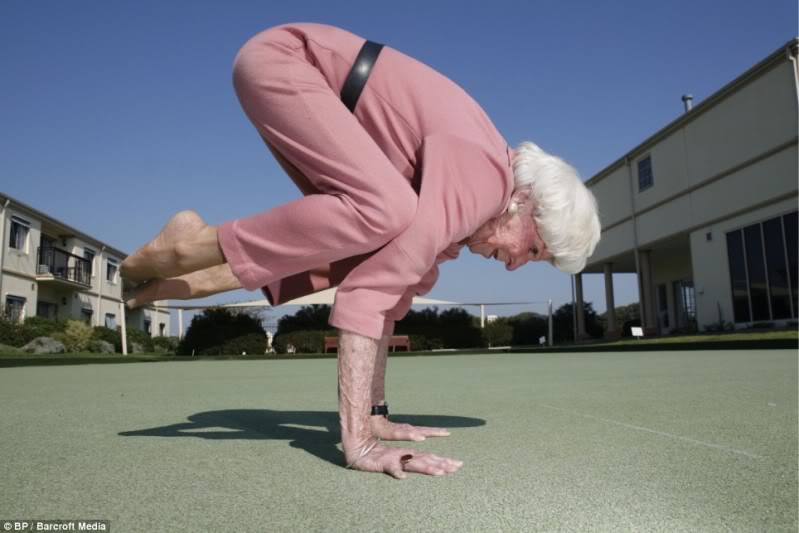 Vicarious Experiences – Role Modeling
Vicarious Experiences – Role Modeling
A cornerstone of social psychology is that we all learn from one another and this influences our own behavior. Much of Bandura’s work has been around modeling whether it was the famous BoBo Doll Experiment (Bandura, et.al. 1961), or filming people crossing the street against a traffic light just because a well-dressed man carrying a briefcase did so. When we see someone being successful at certain behavior we are more likely to try it ourselves. Thus the omnipresence of fad diets and all the fitness trends we witness. Television and the internet serve to expose us to even more models to imitate. Self-efficacy, then, can be affected by observing what others experience.
People who observe a model successfully perform in a challenging situation are more likely to develop an expectation that they can acquire the same skill (Alderman, 1999). So, coaches can encourage clients to find models that will both encourage them and perhaps show them strategies and the skills they need to be successful like their models.
What we know about effective models is that they need to be people we feel positive about and can relate to. Most fitness and wellness magazines, for example, forget this and continuously hold up exceptional examples for us to follow. We may find it extremely hard to identify with celebrities, or a seventy-five year old ultra-marathoner who was an All-American track star in college. Models who are seen as having similar attributes (age, gender, ethnicity, etc.) as ourselves and who have struggled imperfectly, but persevered and succeeded at a similar task are most effective.
 Verbal Persuasion – Social Persuasion
Verbal Persuasion – Social Persuasion
The messages we get from others can have a profoundly positive or negative effect upon our efficacy expectations. When one receives encouragement that “you can do it” our belief in our own capacity for change increases. For these positive verbal statements to be effective though, they must be believable and conveyed by someone the person sees as trustworthy.
The term “persuasion” may be a bit misleading for the coach. The reality is that we really can’t “persuade” someone to be well. It’s not a convincing sales pitch that works, but instead the kind of “I believe you can do it, I believe in you!” statements that a coach sincerely makes that go beyond simple cheerleading.
At the heart of good coaching is what we call “coaching for connectedness” (Arloski, 2009). A key to successful and lasting lifestyle improvement is coaching with the client to help them consciously develop a system of support that will help them attain and maintain the changes they seek. This social support is a central part of Bandura’s message. When clients find walking buddies, social groups with positive peer health norms, or learn how to ask for the support they need, they are much more likely to succeed.
 Physiological Cues
Physiological Cues
Individuals sometimes judge their capability to perform a task by their own physical/emotional experience as they face the task or perform it. If they doubt their ability, possibly fear the consequences of failure, etc., they may experience anxiousness, increased heart rate, sweating, etc. Awareness of these symptoms can trigger even more self-doubt and fear and plunge self-efficacy beliefs further down and affect performance.
Bandura contends that individuals have the capacity for self-regulation. We can affect our physiological states through our awareness, our thought processes and through techniques of breath and relaxation. Wellness coaches can help their clients to become aware of these patterns of anxiousness and help them seek out methods for self-management. Coaching takes it further by helping clients establish accountability around practicing these self-management techniques. Positive mental rehearsal can also be used to reduce anticipatory anxiety and increase confidence in one’s capacity for positive performance. The coach and client can even rehearse in role play for an upcoming event for the same purposes.
Theory and Practice
Social Cognitive Theory (formerly known as Social Learning Theory) helps us see ways to be more effective in working with our clients. It also is very validating to the “coach approach” taken by professional life coaches and professional wellness coaches. There is tremendous congruity between what coaches do and what this theory advises.
Alderman, M. K. (1999). Goals and goal setting. Motivation for ahievement: possibilities for teaching and learning. New Jersey: Lawrence Erlbaum Associates.
Arloski, M. (2009) Wellness Coaching For Lasting Lifestyle Change. Updated Ed. Duluth, MN: Whole Persons Associates.
Bandura, A.; Ross, D.; Ross, S. A. (1961). "Transmission of aggression through the imitation of aggressive models". Journal of Abnormal and Social Psychology 63 (3): 575–582. doi:10.1037/h0045925. PMID 13864605.
Bandura, A. (1977) Toward A Unifying Theory Of Behavioral Change. Psychol Rev. 1977 Mar; 84(2):191-215.
Bandura, A., (1982). Self-efficacy mechanism in human agency. American Psychologist, 37, p. 122-147.
Bandura, A. (1997). Self-efficacy: The exercise of control. New York: Freeman
Kimsey-House, H., Sandahl, P., Whitworth, L. (2011) Co-Active Coaching: Changing Business, Transforming Lives. Nicholas Brealey; Third Edition.
THE Coaching “Bible”! Best book on basics of coaching and coaching skills.
Naydock, G. R. How Would Bandura Increase Self-Efficacy In Therapy. http://www.slideshare.net/gerdnaydock/how-bandura-would-increase-self-efficacy
Pajares, Frank (2002) Overview of Social Cognitive Theory and of Self-Efficacy, Emory University, Archived at: http://www.uky.edu/~eushe2/Pajares/eff.html
Prochaska, J., Norcross, J, & Diclemente, C. (1994) Changing For Good. New York, NY: Harper Collins/Quill. 1994 Harper Collins, 2002 Quill reprint.
SELF-EFFICACY - http://www.coe.uga.edu/epltt/motivation/con_selfefficacy.htm
Content is the copyrighted material of Real Balance Global Wellness Services, Inc., 2014 and may be used only for educational purposes and only when complete credit is given for its source.
Michael Arloski, Ph.D., Ph.D., CWP, is a psychologist, certified wellness coach and Founder and CEO of Real Balance Global Wellness Services, Inc. and Dean of The Wellness Coach Training Institute.
Michael Arloski, Ph.D., PCC, CWP
www.realbalance.com
1-866-568-4702








Only registered and logged in readers can leave comments.